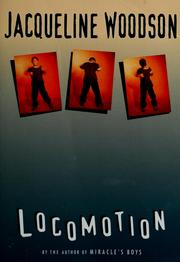 Locomotion/Peace, Locomotion
Locomotion/Peace, LocomotionJacqueline Woodson
Putnam, 2003/2007 100pgs./136 pgs.
Grades 4-7
Narrative Poetry

Lonnie, otherwise known as "Locomotion", traces his life as an eleven-year-old Brooklyn foster-kid coping with the death four years ago of his parents and separation from his little sister, Lily. Lonnie is a sad boy who struggles to find sense in the world. Unable to communicate his feeling and afraid of being judged, he finds an outlet through poetry, introduced to the classroom by super-teacher Ms. Marcus. Through Lonnie's poems, we experience his life and emotions and, eventually, some joy and hope in life. The story continues in Peace, Locomotion, as Lonnie begins a new year in school with a destructive teacher, who makes him doubt his writing abilities and deals a blow to his self-esteem. Luckily for Lonnie, the teacher goes out on maturity leave and a new, nurturing teacher takes over. This second volume is all about peace, both in Lonnie finding peace in his own life and peace overseas, as his foster brother returns home from war physically and mentally damaged. Lonnie finally learns to trust his foster family, finds his place within the unit and comes to terms with being separated from his sister. Healing and, yes, long awaited peace are coming to Lonnie and those around him and we leave him with much hope for the future.
After reading Woodson's Brown Girl Dreaming I had to finally catch up on the Locomotion books. Although a long-time fan of Woodson's work, somehow I missed these two slender volumes. It is well worth the time spent with Locomotion. As in Brown Girl Dreaming, Woodson's narrative poems are honest and heartfelt and make the reader feel the setting, emotions, and story of the narrator. I came away from Locomotion knowing Lonnie and worrying about him, until I went ahead and read the second book and found my own sense of peace. The books read quickly and would be a wonderful way to introduce poetry to reluctant students or those who feel that they don't like it. Woodson is not afraid to delve into some tricky topics such as religion, death of a parent, what life is like in a group home, childhood illness, and the ethics of war. Some of the messages she leaves us with is the power of poetry, the amazing influence a good (or bad) teacher can have on a child's life, and finding the good in every situation. Lonnie learns to find beauty in his world and comes not only to accept his situation but discover happiness and true peace. I found these books so moving and inspiring I walked away charged up to become a foster-parent, which will require a serious conversation with my husband and daughters. In the meantime I am recommitted to treating the young people that I serve at the library with kindness and respect--and expose them to poetry!
No comments:
Post a Comment